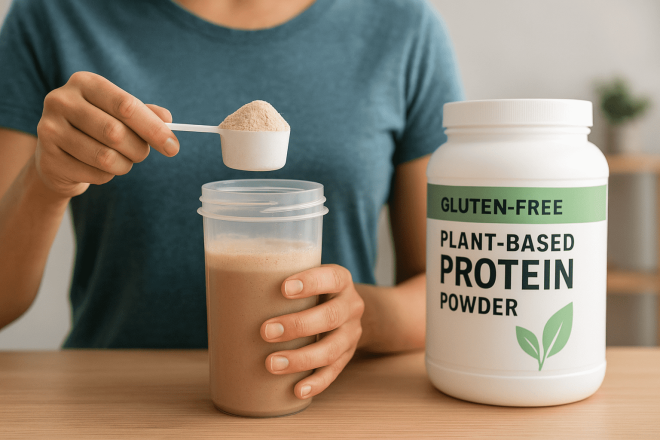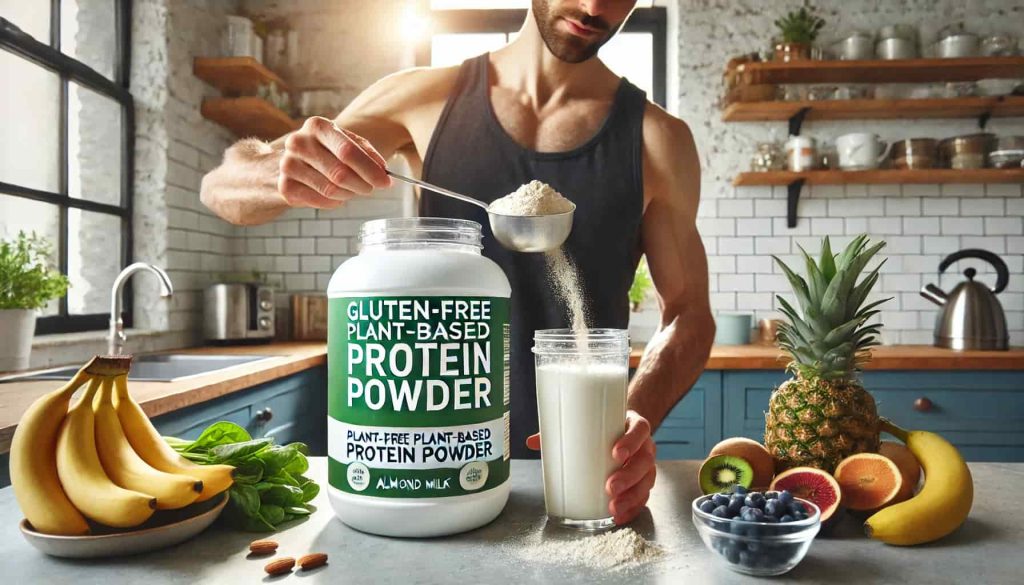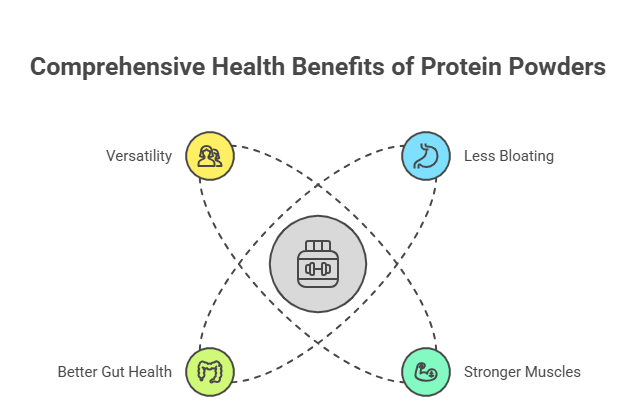
Finding the right protein powder isn’t always easy. Many people try different ones, only to end up with stomach problems like bloating or gas. That’s where gluten-free, plant-based protein powders for sensitive stomachs come in.
These powders are made to be gentle on your gut. They skip the usual troublemakers like gluten, dairy, and artificial sweeteners and instead use simple, natural ingredients. The result? You still get the protein your body needs to build muscle and stay healthy, without the uncomfortable side effects.
In this blog, we’ll explain why these powders are different, how they work, and which ones are worth trying if you have a sensitive stomach
Why Sensitive Stomachs Need Special Protein Powders
Not all protein powders are friendly to your stomach. Many of them contain things like gluten, dairy, soy, gums, or artificial sweeteners. While these ingredients might not bother some people, they can cause real trouble for others.
If you have a sensitive stomach, these additives can lead to problems like bloating, cramps, or even stomach pain. That’s why clean, allergen-free protein powders are so helpful. By removing harsh ingredients and using simple, plant-based proteins like peas or rice, these powders make it easier for your body to digest. Some even add things like digestive enzymes or probiotics, which give your gut extra support.
In short, the right protein powder can fuel your body without upsetting your stomach.
Key Features of Gluten-Free Plant-Based Protein Powders
What makes these protein powders special? Let’s break it down:
- Gluten-free and plant-based: They’re safe for people with celiac disease, gluten intolerance, or anyone who has food sensitivities.
- Gentle protein sources: Powders often use pea, hemp, rice, or mung bean protein-these are easier to digest than dairy or soy.
- Balanced nutrition: Some powders mix different plants together (like pea, rice, chia, and mung bean) to create a “complete” protein with all the amino acids your body needs.
- Clean ingredients: No gums, dairy, soy, vegetable oils, or artificial sweeteners that can upset your stomach.
- Digestive support: Some blends add enzymes (like protease) to help your body break down protein, along with prebiotics and probiotics to keep your gut happy.

ALT TAG: A person in a bright modern kitchen scooping gluten-free plant-based protein powder into a blender bottle filled with almond milk.
Benefits Beyond Digestion
These powders aren’t just easy on your stomach, they also support your health in other ways:
- Less bloating, easier digestion: You get the protein without the stomach discomfort.
- Stronger muscles: Protein helps repair muscles after exercise and keeps your body fueled.
- Better gut and immune health: Probiotics and prebiotics help balance your digestion while giving your immune system a boost.
- For everyone: Whether you’re an athlete, into fitness, or just looking for a gentle protein option, these powders fit many lifestyles.

Brand & Product Highlights
There are many protein powders out there, but only a few are made to be gentle on sensitive stomachs. Here are some good options:
- NorCal Organic Premium Pea Protein: Recommended by Health.com, this powder is very clean and free from common allergens.
- Orgain Organic Protein Powder: Featured in Forbes and Women’s Health, this blend uses different plant proteins and is known for being easy to digest.
- Previnex Protein: Highlighted by DadFuel and the Previnex blog, this powder is made for sensitive stomachs and includes digestive enzymes to help with absorption.
- So Lean & So Clean by Ora Organic: A popular choice because it uses clean ingredients, adds digestive enzymes, and avoids bloating.
- Other good mentions: Brands like Amazonia and Holland & Barrett also offer vegan and gut-friendly protein powders.
How to Choose the Right Powder for You
Picking the best protein powder doesn’t have to be hard. Here are some simple tips:
- Check the label: Avoid powders with gluten, dairy, soy, artificial sweeteners, or gums if you have a sensitive stomach.
- Go for complete proteins: Look for blends that combine different plants (like pea + rice) to give you all the amino acids your body needs.
- Look for digestive support: Powders with enzymes or probiotics are easier on the stomach.
- Match your goals: If you want to build muscle, choose a higher-protein blend. For meal replacement or general wellness, look for powders with added nutrients and fiber.
Conclusion: My Experience
I know how frustrating it can be to try protein powders that end up causing bloating, gas, or stomach pain. I’ve been there too, and it can make you feel like maybe protein powders just aren’t for you. That’s why I was so relieved when I discovered gluten-free, plant-based protein powders. They’re made with clean, simple ingredients and skip the common triggers like gluten, dairy, and artificial sweeteners. The difference is huge, you still get the protein your body needs for energy and muscle recovery, but without the stomach issues.
What I’ve learned is that choosing the right powder really comes down to the label. Look for blends that use pea, rice, or hemp protein, and pick ones that include digestive enzymes or probiotics if you want extra gut support. Once you find the right fit, you’ll see how easy it is to fuel your body while keeping your stomach happy.
Frequently Asked Questions
Q: What is the best gluten-free plant-based protein powder for sensitive stomachs?
A: Some top choices include NorCal Organic Pea Protein, Orgain Organic Protein Powder, Previnex Protein, and Ora Organic’s So Lean & So Clean. These are made with clean, gentle ingredients that won’t upset your stomach.
Q: Can pea protein upset digestion?
A: Pea protein is usually very easy to digest and is one of the best choices for sensitive stomachs. But like any food, a small number of people might feel mild gas or bloating at first.
Q: Are plant-based protein powders good for building muscle?
A: Yes, Plant proteins like pea and rice can give your body all the amino acids it needs for muscle repair and growth, especially when blended together.
Q: Should I take plant protein every day if I have a sensitive stomach?
A: It’s safe to take daily, as long as you choose a clean, gluten-free, allergen-free powder. Start with one serving a day to see how your body responds.
Q: How do probiotics and digestive enzymes in protein powder help digestion?
A: Probiotics add “good bacteria” that support a healthy gut, while digestive enzymes help your body break down protein more easily. Together, they reduce bloating and improve nutrient absorption.
GIPHY App Key not set. Please check settings